Hyvä Theme is Now Open Source: What This Means for Magento Community - Mageplaza
Hyvä is now Open Source and free. Discover what changed, what remains commercial, how it impacts the Magento ecosystem, and how to maximize its full potential.

Artificial intelligence (AI) has become a game-changer in marketing, revolutionizing traditional strategies.
As “AI” may appear everywhere,” its importance in today’s marketing world cannot be ignored. However, navigating the complexities of AI can be daunting for businesses striving to stay ahead.
For those feeling overwhelmed or lacking expertise, seeking assistance from specialized AI marketing agencies is crucial. This article highlights the top 7 agencies adept at leveraging AI to propel brands into the future.
AI marketing companies can significantly enhance your marketing operations in various ways:
Personalized Marketing Campaigns: Leveraging AI, these companies can craft personalized messages tailored to each customer or audience, fostering stronger relationships. By employing specialized machine learning (ML) algorithms, AI marketing firms swiftly generate personalized campaigns that yield results with minimal effort.
Media Analytics: AI facilitates media analytics, offering substantial insights into consumer reactions, behaviors, and engagement with products or services. Through machine learning and computer vision, AI enables businesses to comprehend customer behaviors and reactions effectively, aiding in informed decision-making.
Conversational AI: A prevalent AI marketing application, conversational AI streamlines customer interactions by automating conversations in a personalized manner. This technology enables businesses to engage with customers in a more human-like manner, enhancing customer satisfaction and engagement.
Predictive Analytics: AI-powered predictive analytics provides comprehensive insights into customer behavior, empowering businesses to make informed marketing decisions. By partnering with AI marketing companies, businesses gain access to predictions about user behavior, enabling targeted marketing strategies.
Marketing Automation: AI marketing companies offer marketing automation solutions that streamline marketing tasks such as advertising, design, and copywriting. By automating these activities, businesses can save time and resources, allowing them to focus on other critical aspects of their operations.
The technology powering AI in marketing is rapidly evolving, ensuring its increasing prominence. Various types of AI in marketing include:
Textual AI: Include grammar and written content assistance tools.
Visual AI: Generate visual content, such as art and graphics.
Interactive AI: Utilize generative language models like chatbots for interactive communication.
Functional AI: Engage in operational tasks or learning activities independently or in conjunction with other tools.
Analytical AI: Facilitate automated reporting, interpretation, and metadata processing, often using Boolean logic.
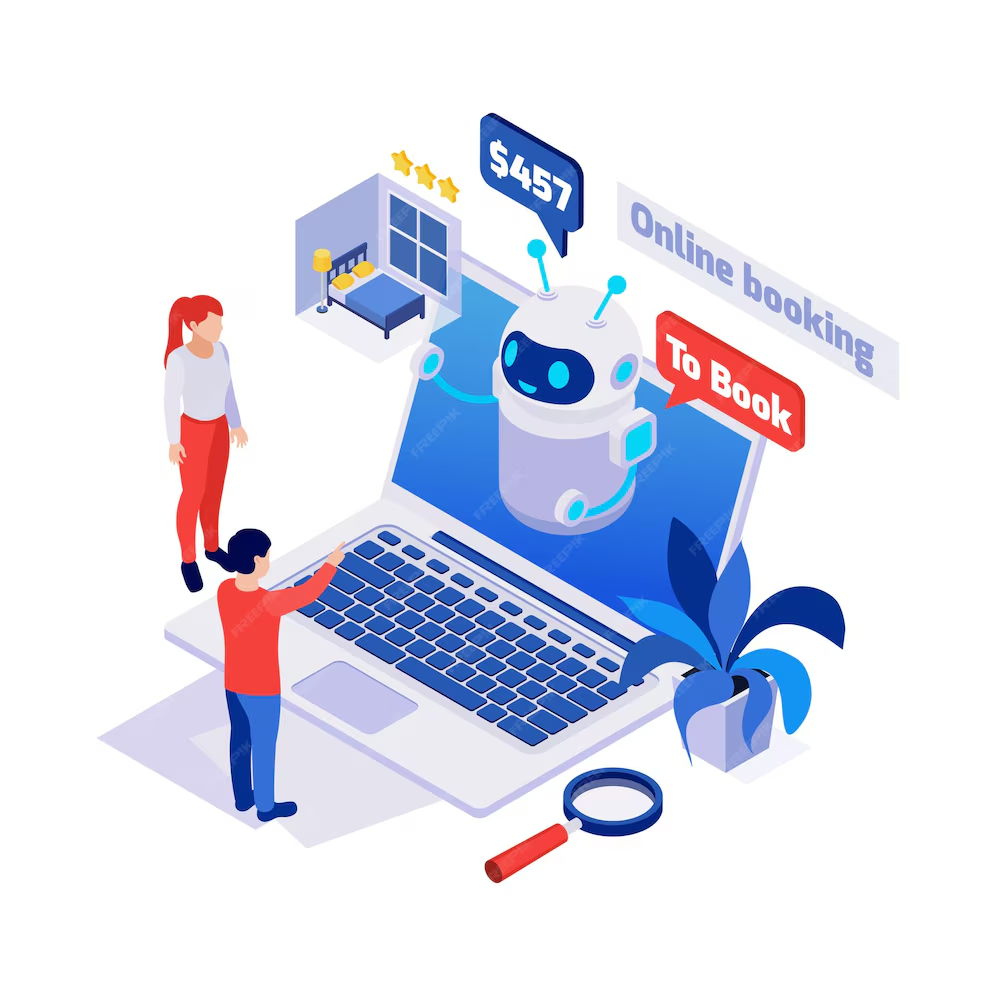
AI marketing agencies offer a variety of services leveraging artificial intelligence to enhance marketing strategies:
AI-Powered SEO
Predictive Analytics
Chatbots and Virtual Assistants
Personalized Content Creation
Programmatic Advertising
Customer Segmentation
Email Marketing Optimization
Voice Search Optimization
Visual Recognition
Sentiment Analysis
Dynamic Pricing
Recommendation Engines
Lead Scoring
Conversational Marketing
Data Analytics and Visualization
A/B Testing and Optimization
Video Analysis and Optimization
These services offer a data-driven approach tailored to individual business needs.

Salesforce’s Marketing Cloud is a digital marketing platform designed to assist businesses in engaging with customers, fostering lasting relationships, and boosting revenue. The platform utilizes AI and data to facilitate personalized marketing campaigns and enhance customer experiences.
Key Features:
Data Cloud for Marketing: Unifies real-time data across Salesforce and other platforms for personalized engagements across channels.
Personalization: Delivers real-time personalized experiences across channels.
Engagement: Increases conversion rates through relevant engagement across email, advertising, mobile, etc.
Account Engagement: Enhances revenue teams’ effectiveness with account-based marketing and automation.
Loyalty Management: Aligns marketing and loyalty efforts around VIP customer experiences.
Intelligence: Optimizes marketing performance with omnichannel intelligence.
Case Study:
Formula 1 has teamed up with Salesforce, a leading global customer relationship management (CRM) provider, to enhance fan engagement and sustainability initiatives. Utilizing Salesforce’s technology, including Customer 360, Formula 1 aims to gain insights into its global fanbase, personalize experiences, and deepen engagement. The partnership aims to strengthen the bond between Formula 1 and its fans while advancing sustainability objectives.

Albert is a specialized AI marketing agency that focuses on digital marketing and advertising. It specializes in leveraging autonomous AI to enhance and refine paid advertising campaigns across various platforms like Google, Facebook, Instagram, YouTube, and Bing. Operating as a cloud-based platform, Albert seamlessly integrates with marketers’ existing technology stacks to analyze campaigns, manage budgets, and improve performance.
Key Features:
Empower marketers with AI-driven tools.
Augment tasks and decision-making processes.
Collaborate with marketers, leveraging AI capabilities.
Handle repetitive and analytical tasks.
Free marketers to focus on strategy and creativity.
Case Study:
Crabtree & Evelyn, a retail brand, joined forces with Albert to tackle the challenge of attracting new customers, boosting revenue, and providing a positive return on investment. Albert devised a robust strategy for the brand’s Facebook paid social program, emphasizing testing and enhancing cost efficiency. The autonomous AI provided in-depth insights and optimization, leading to a 30% increase in return on ad spending (ROAS) within less than two months.
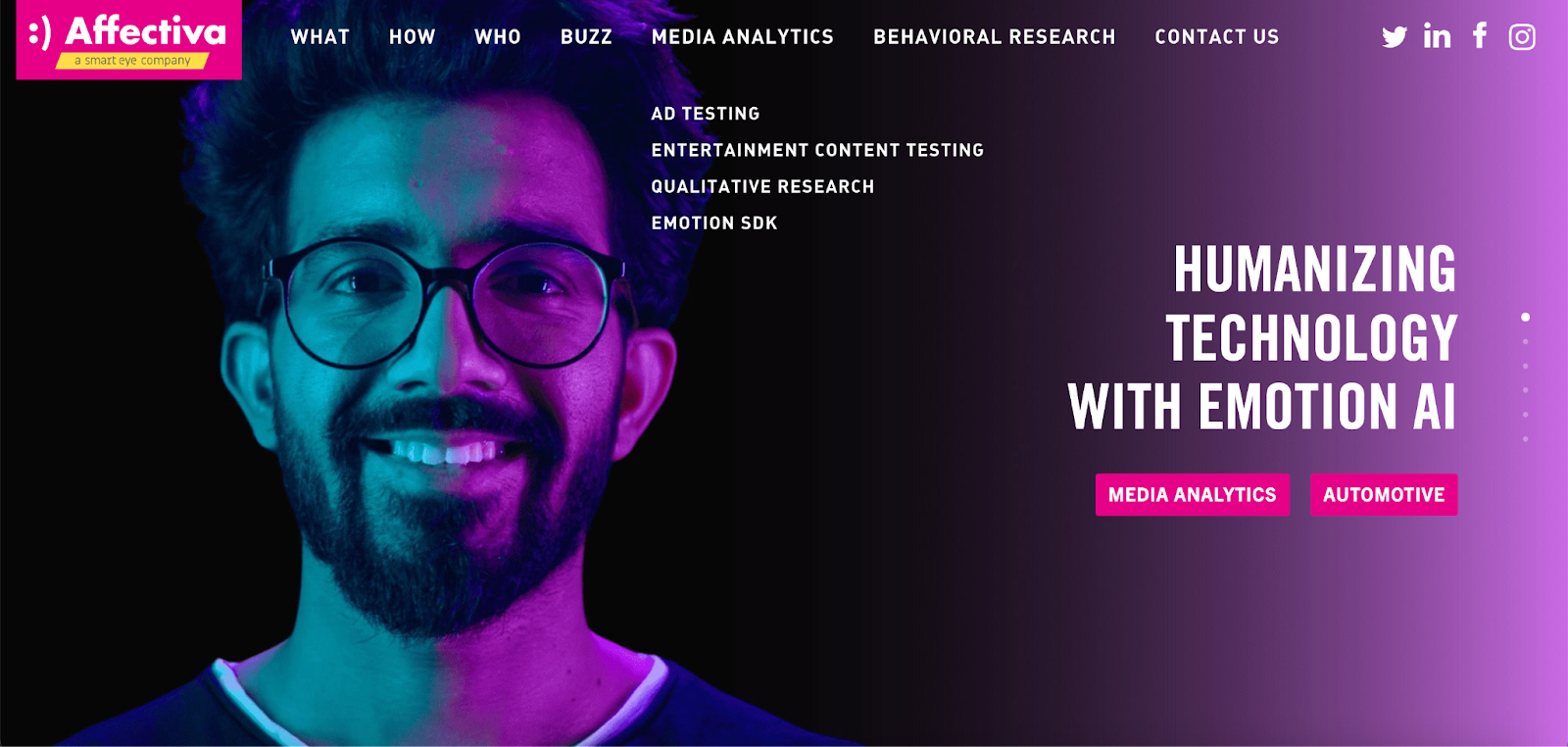
Affectiva stands out as an AI marketing firm specializing in emotion recognition technology. Their software employs computer vision, machine learning, and deep learning techniques to interpret subtle facial and vocal cues, allowing for the identification and analysis of human emotions and cognitive states. The company’s overarching goal is to humanize technology and bridge the gap between humans and machines.
Key Features:
Insights into consumer engagement.
Emotional response analysis for understanding customer preferences and behaviors.
Case Study:
Affectiva’s Media Analytics arm has made significant strides within the industry. Currently, their Media Analytics solutions are embraced by 90 percent of the world’s largest advertisers and 26 percent of Fortune Global 500 companies. These remarkable statistics underscore the effectiveness and value that Affectiva delivers to media, entertainment, and market research enterprises.
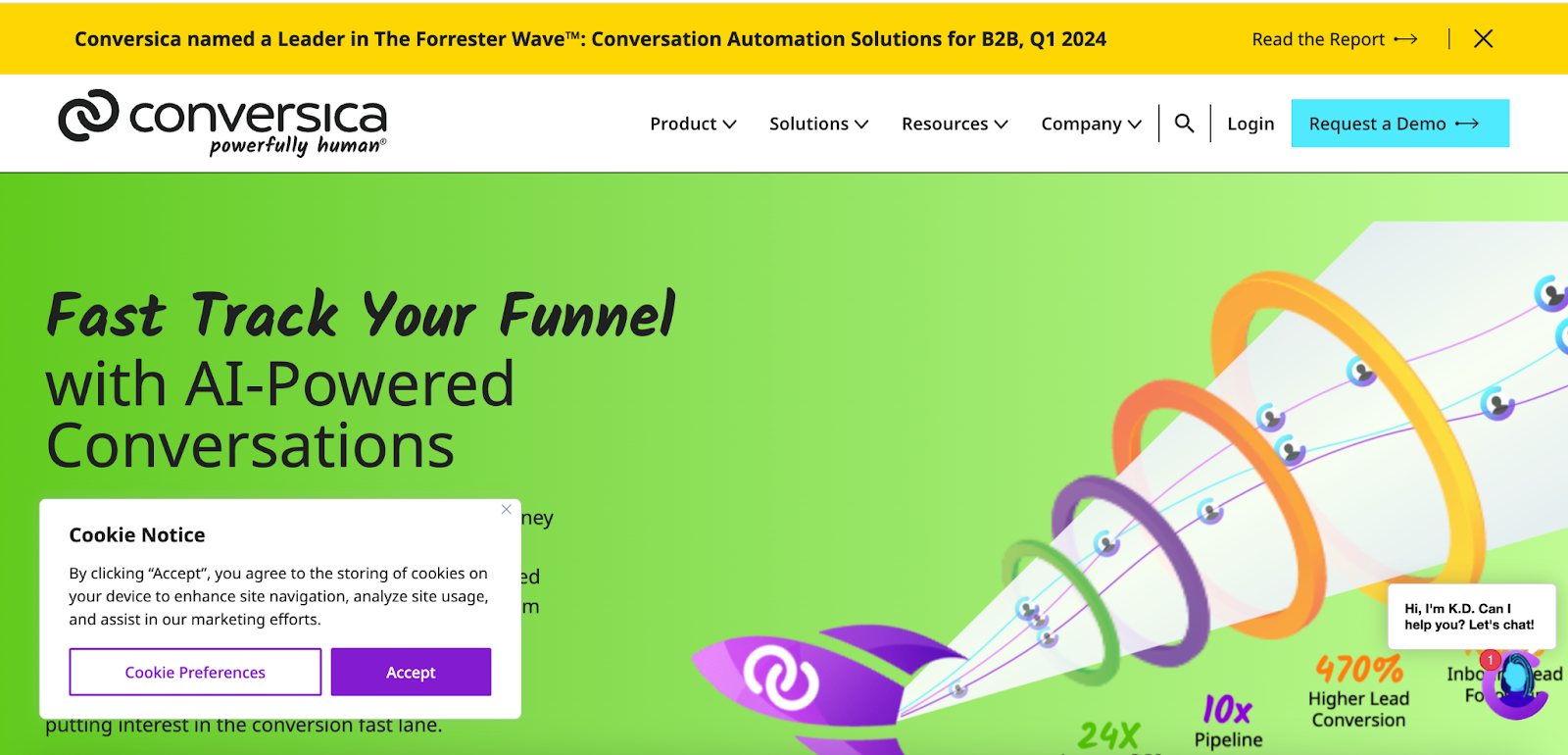
Conversica’s Conversational Marketing solution, provided by Conversica, is geared towards engaging and interacting with website visitors, leads, and customers through personalized conversations facilitated by AI-powered assistants. These assistants, known as Revenue Digital Assistants™, are crafted to deliver a human-like conversational experience while catering to various stages of the customer journey.
Key Features:
Suite of AI-powered conversational solutions.
Revenue Digital Assistants™ manage conversations across the customer revenue lifecycle.
Conversational Customer Success emphasizes personalized two-way conversations to drive adoption, increase retention, and enhance customer experiences.
Case Study:
Hootsuite, a prominent social media management tool, encountered difficulties in effectively managing a high volume of leads. To address this challenge, Hootsuite integrated Revenue Digital Assistants for Marketing and Sales by Conversica. The results were impressive:
A 10x increase in conversions from content-sourced leads.
A remarkable 700% surge in engagement.
The addition of 108,000 hours of capacity.
These enhancements enabled Hootsuite to bolster pipelines, capitalize on opportunities, and optimize lead engagement and sales readiness effectively.
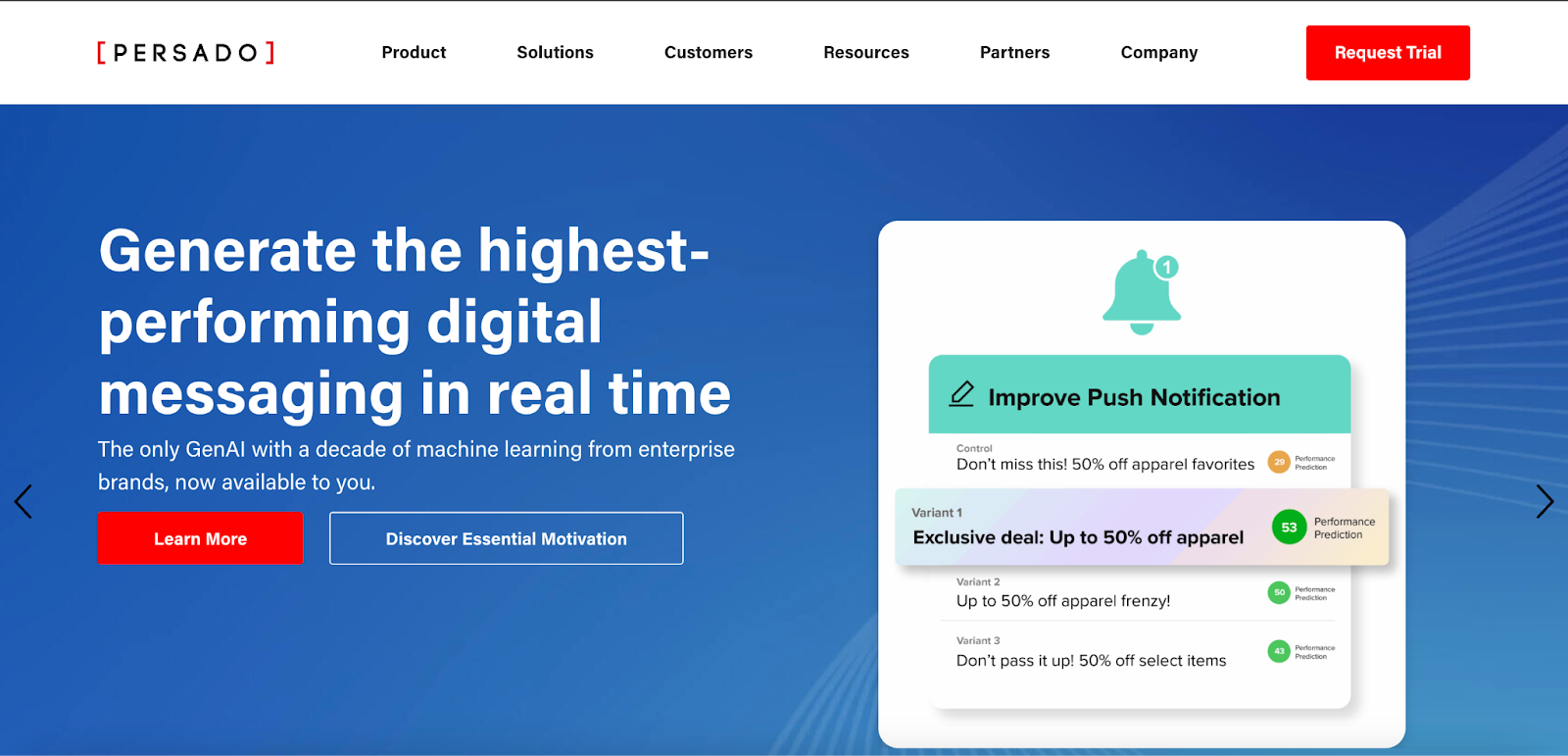
Persado is a company that specializes in AI-driven marketing solutions designed to enhance customer engagement and drive business outcomes. Their approach involves leveraging artificial intelligence to optimize marketing creative elements such as copywriting and design, ultimately leading to improved brand engagement and revenue performance.
Key Features:
AI in Digital Marketing Creative: Persado analyzes vast text samples to optimize creative content generation.
AI-Driven Copywriting: Persado’s AI-powered solutions analyze text patterns to create compelling copy.
Case Study:
Persado collaborated with Vanguard, a prominent investment management firm, to enhance their conversion rates using AI-generated language. By harnessing Persado’s AI technology, Vanguard experienced a notable 15% increase in conversion rates, leading to enhanced customer engagement and improved business performance.
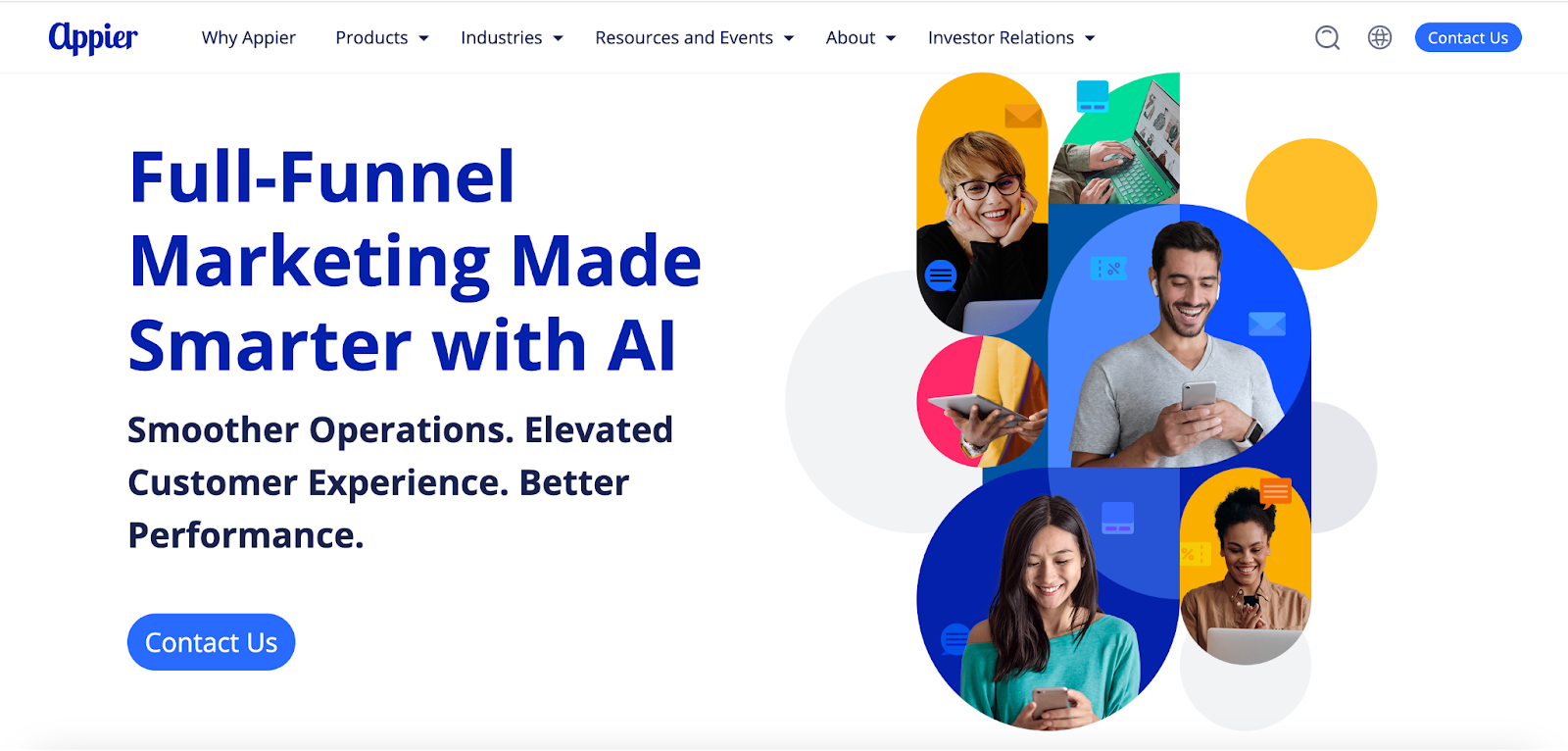
Appier, an AI-driven marketing firm, offers tailored solutions across various sectors such as e-commerce, retail, finance, and insurance. It furnishes comprehensive marketing solutions covering the entire customer journey.
Key Features:
CrossX - Branding: A solution employing AI to enhance brand visibility, understand user preferences, create captivating content, and ensure brand safety.
AIXON - Intelligent Data Augmentation Platform: Utilizes AI for audience insights, data enrichment, ad performance optimization, and personalized engagement.
AIXPERT - Autonomous Operations: An AI assistant managing campaign decisions and user acquisition across channels.
Bot Bonnie - Conversational AI: A no-code platform leveraging messaging for improved brand interaction and sales.
Case Study:
In a notable case, Toyota Philippines collaborated with Appier to drive traffic to its website amid the COVID-19 pandemic. Toyota aimed to assist customers with virus advisories, virtual engagement, maintenance tips, and community support. Appier facilitated audience analysis, precise targeting, and cross-screen ad delivery.
Resultantly, Toyota witnessed a threefold increase in website traffic, surpassing the target of 44,073 visits per month. Appier’s AI technology enabled real-time strategy adjustments, contributing significantly to campaign success.
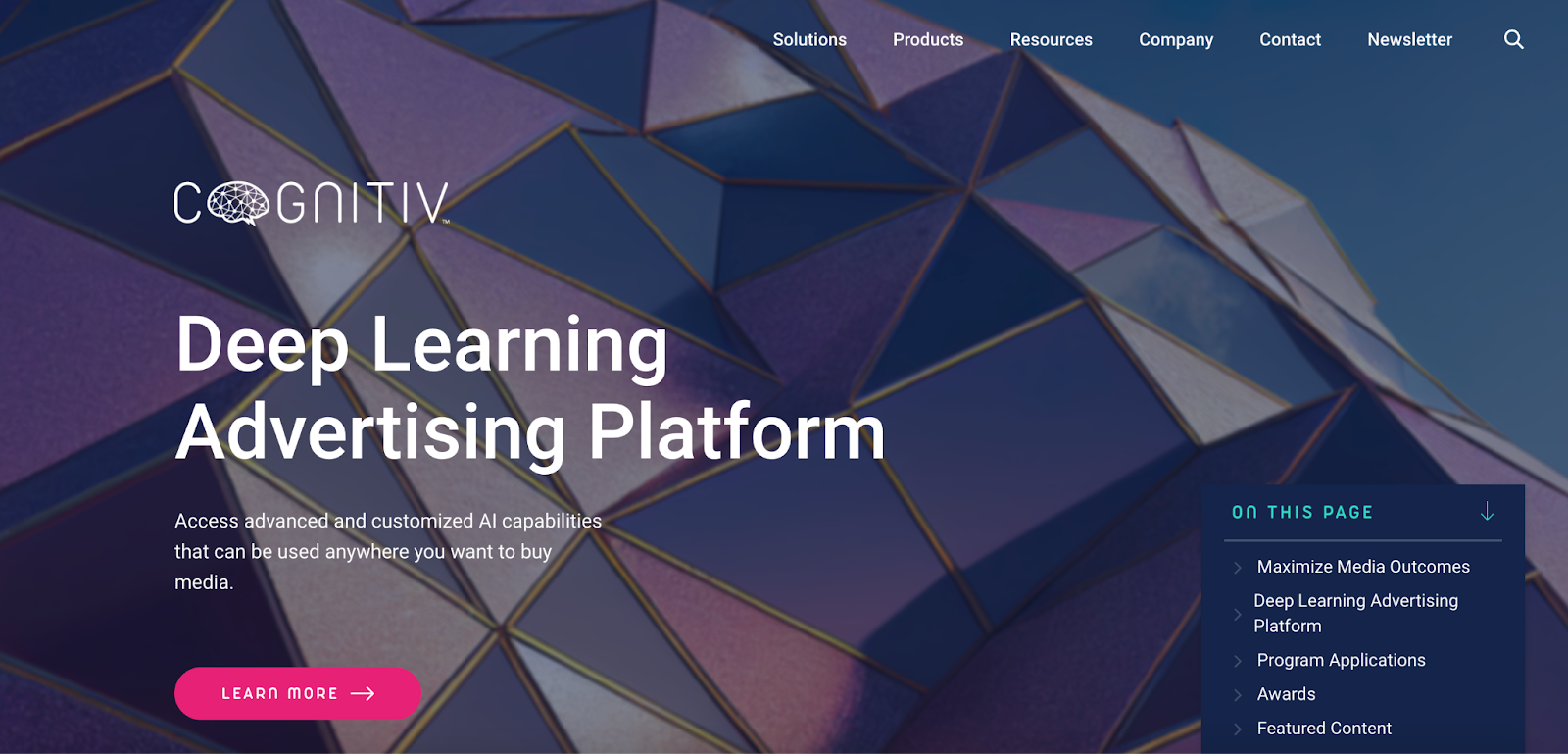
Cognitiv is an AI marketing firm that specializes in deploying advanced deep learning solutions tailored for marketing and advertising purposes. Their array of products and services is designed to assist marketers in optimizing their campaigns and achieving superior outcomes.
Key Features:
Deep Learning for Performance Advertising: Cognitiv.ai utilizes custom algorithms to deliver tailored ads based on customer preferences.
NeuralMind™ Platform: Cognitiv.ai’s NeuralMind platform predicts consumer behavior, boosting conversions and enhancing customer lifetime value.
Custom Deep Learning Algorithms: Tailored algorithms determine the ideal timing, type, and placement of advertisements, leading to increased conversion rates.
Case Study:
LOLA, a feminine care brand, collaborated with Cognitiv to amplify brand awareness and drive sales across key retailers and online platforms. The primary objective was to engage women aged between 25 and 49, expand brand visibility, and uncover new customer segments.
Remarkable results were achieved through the deployment of geofenced ads specifically targeting zip codes where LOLA products were available at Walmart or Meijer stores. The campaign yielded a remarkable 30% increase in sales, reaching 2.9k unique users, and delivering a 3.5x increase in user ad exposure through innovative creatives.
When searching for an expert in AI-powered digital marketing, there are several considerations to bear in mind:
Expertise: Assess the agency’s experience within your industry. Their familiarity with your industry’s nuances, customer behaviors, and market trends can give them an advantage in crafting tailored AI marketing strategies that resonate with your target audience.
Service Offerings: Investigate the breadth and depth of marketing services they provide. An agency offering a comprehensive suite of AI-powered tools and services can deliver more holistic solutions, addressing all aspects of your marketing needs.
Pricing Model: Discuss the agency’s pricing structure and how they gauge ROI. Ensure their pricing aligns with your budget and that they can demonstrate a track record of delivering tangible results through their planned AI marketing campaigns.
Technological Proficiency: Assess the agency’s competence with the latest AI technologies. Their deep knowledge and hands-on experience in AI marketing signify their commitment to staying at the forefront of the industry.
Communication: Evaluate the agency’s communication and collaboration style. Effective collaboration is essential for a successful partnership. Consider their responsiveness, willingness to address your inquiries, and ability to grasp your business needs.
Client Feedback and Case Studies: Review testimonials from previous clients and examine their case studies. This can offer insights into the agency’s effectiveness, reliability, and the types of results they’ve achieved for other businesses.
AI in digital marketing streamlines tasks, offering efficiency and cost savings. Its increasing affordability makes it accessible to businesses of all sizes. Failure to adopt AI risks falling behind competitors, as over 80% of industry experts already integrate AI into marketing.
Also, AI-driven solutions, such as chatbots and fraud detection, can save businesses significantly in customer service and fraud prevention costs.
Let’s delve into why businesses should utilize AI in marketing with a more focused perspective:
AI systems have the capability to analyze past consumer behaviors and trends, enabling them to anticipate future actions. This predictive analysis empowers businesses to stay ahead of competitors by crafting marketing strategies tailored to anticipated consumer needs.
For example, consider Netflix observing a trend among its users who binge-watch ’80s and ’90s sitcoms during the winter months. Furthermore, through sentiment analysis of user reviews and social media, the platform identifies nostalgia as a key driver for this viewing behavior, particularly during the holiday season.
Leveraging predictive analytics, Netflix foresees an uptick in demand for classic sitcoms and nostalgic content in the upcoming winter. Consequently, Netflix may:
Secure additional licensing agreements for classic sitcoms ahead of winter.
Introduce a dedicated “Nostalgia” category on their homepage as the winter season approaches.
Commission a holiday-themed reunion episode of a beloved ’90s show.
Roll out targeted email and in-app campaigns, promoting this content to users who have previously shown interest in similar shows.
Traditional marketing methods typically rely on post-campaign analysis to gauge effectiveness. However, with AI, campaigns can be continuously monitored and adjusted in real time, ensuring that marketing efforts are always optimized for optimal results.
For example, let’s consider a local coffee shop named “Bean Bliss” launching an online ad campaign to promote its new summer cold brew range. They create two different ad creatives: one featuring a cold brew on a sunny patio (Ad A) and the other showcasing friends enjoying their drinks (Ad B).

In a traditional approach, Bean Bliss would run both ads for a month, analyze performance, and then decide on future strategies. Yet, with AI-driven real-time optimization, the system tracks both Ad A and Ad B’s performance from the campaign’s start. Within days, it recognizes Ad A’s significant outperformance over Ad B. Instead of waiting for the campaign’s end, the AI system immediately reallocates more budget to promote Ad A, ensuring ongoing optimization.
AI’s notable advantage lies in its capacity to analyze extensive data sets and customize marketing strategies accordingly. For instance, Amazon employs algorithms to recommend products based on past purchases. If a customer buys sneakers, the system might suggest complementary items such as athletic socks, gym bags, water bottles, fitness trackers, or books related to sports.
Similarly, travel websites utilize dynamic content display to personalize their homepage and landing pages. Users interested in adventure travel might encounter content featuring mountain trekking or scuba diving, aligning with their preferences and interests.
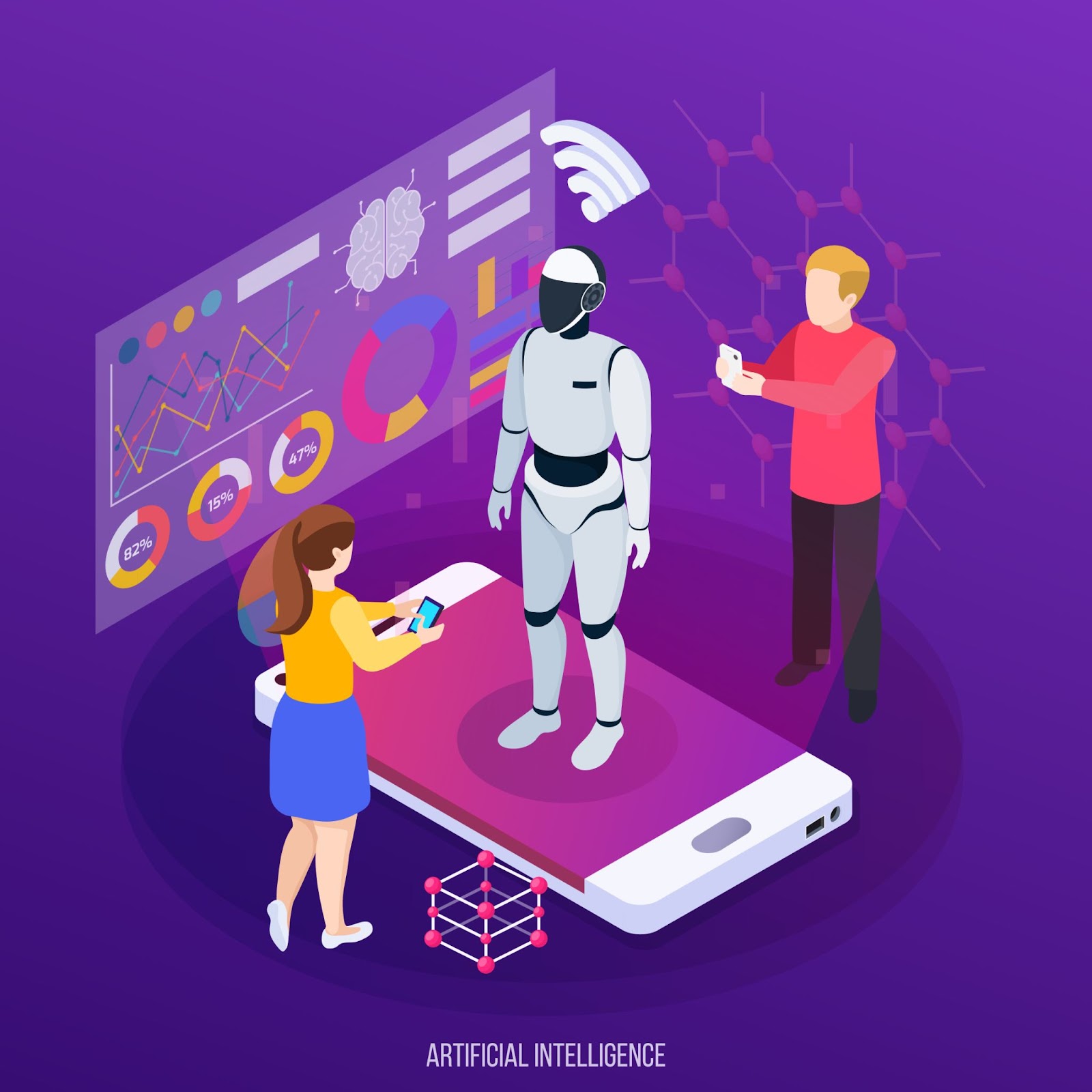
AI is changing how marketing operates, allowing for highly targeted campaigns, instant data analysis, and adaptable content generation. Unlike traditional methods, which typically depend on broad strategies and reflections after campaigns, AI empowers marketers to adjust strategies in real-time, leading to increased relevance and optimized return on investment.
While you have the option to engage a specialized agency, such as one focused on real estate marketing, for AI marketing assistance, it’s more practical to enlist an AI digital marketing agency with expertise spanning multiple industries.
An AI marketing is a distinct marketing entity that utilizes artificial intelligence to refine and improve marketing strategies for businesses. These agencies employ sophisticated AI tools to analyze data, forecast consumer behavior, and automate marketing processes, providing customized solutions tailored to each business’s requirements.
By merging AI with traditional marketing methods, these agencies lead the marketing sector, empowering global business clients to attain more precise and effective marketing results.
This technology aids AI marketing firms by improving data analysis, customizing campaigns, automating routine tasks, forecasting consumer behavior, and dynamically optimizing marketing strategies, resulting in more impactful campaigns and enhanced ROI.
Absolutely. Many affordable AI solutions are designed specifically for small businesses, helping them enhance customer personalization, automate tasks, gain insights from data, and optimize campaigns efficiently. With AI tools, small businesses can compete effectively, understand their customers better, and achieve higher marketing ROI despite resource constraints.
AI marketing agencies utilize advanced technology to swiftly analyze large datasets, providing predictive insights, automating mundane tasks, and delivering highly personalized campaigns in real-time.
Conversely, traditional agencies rely on human skills, manual analysis, historical data, and traditional marketing techniques.